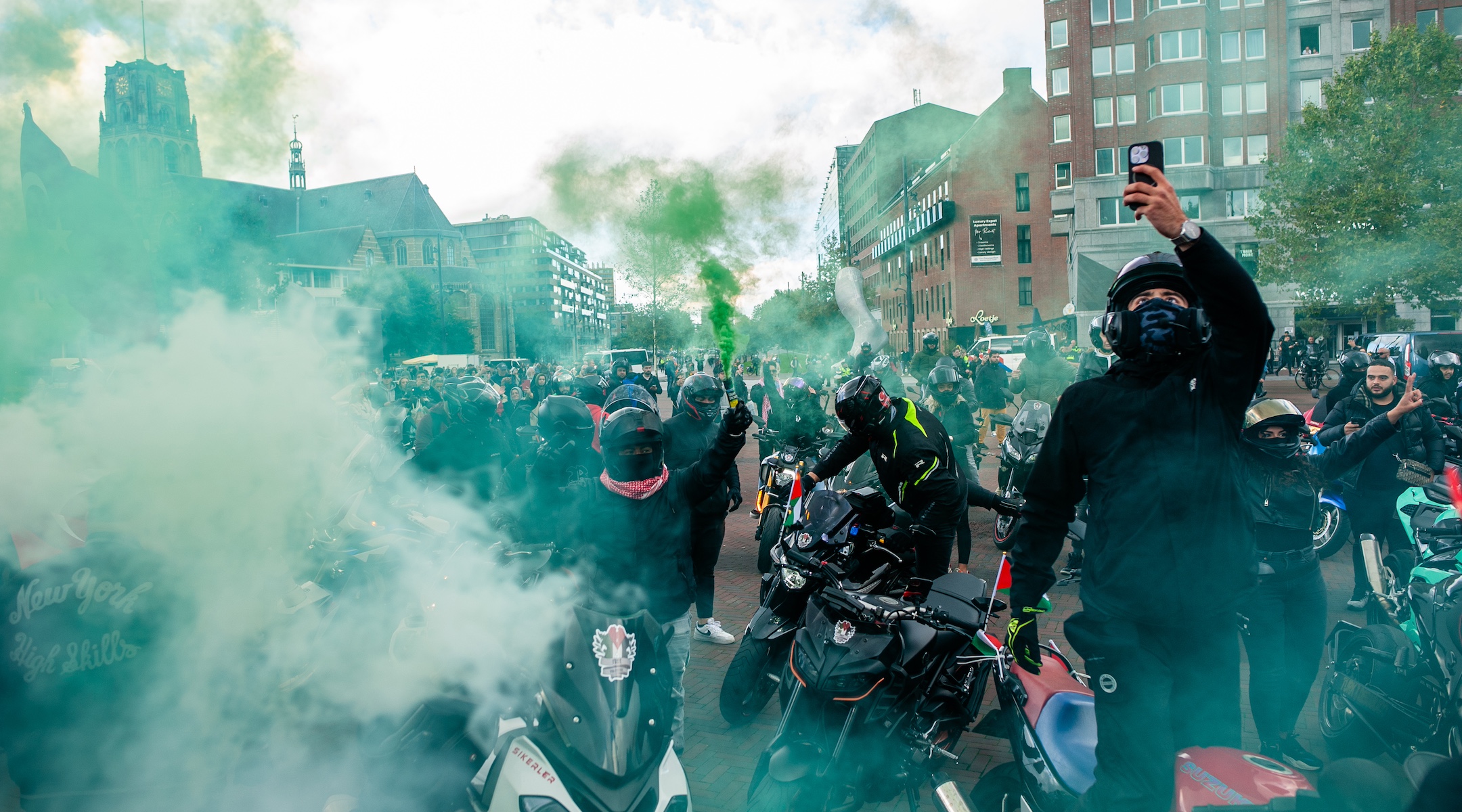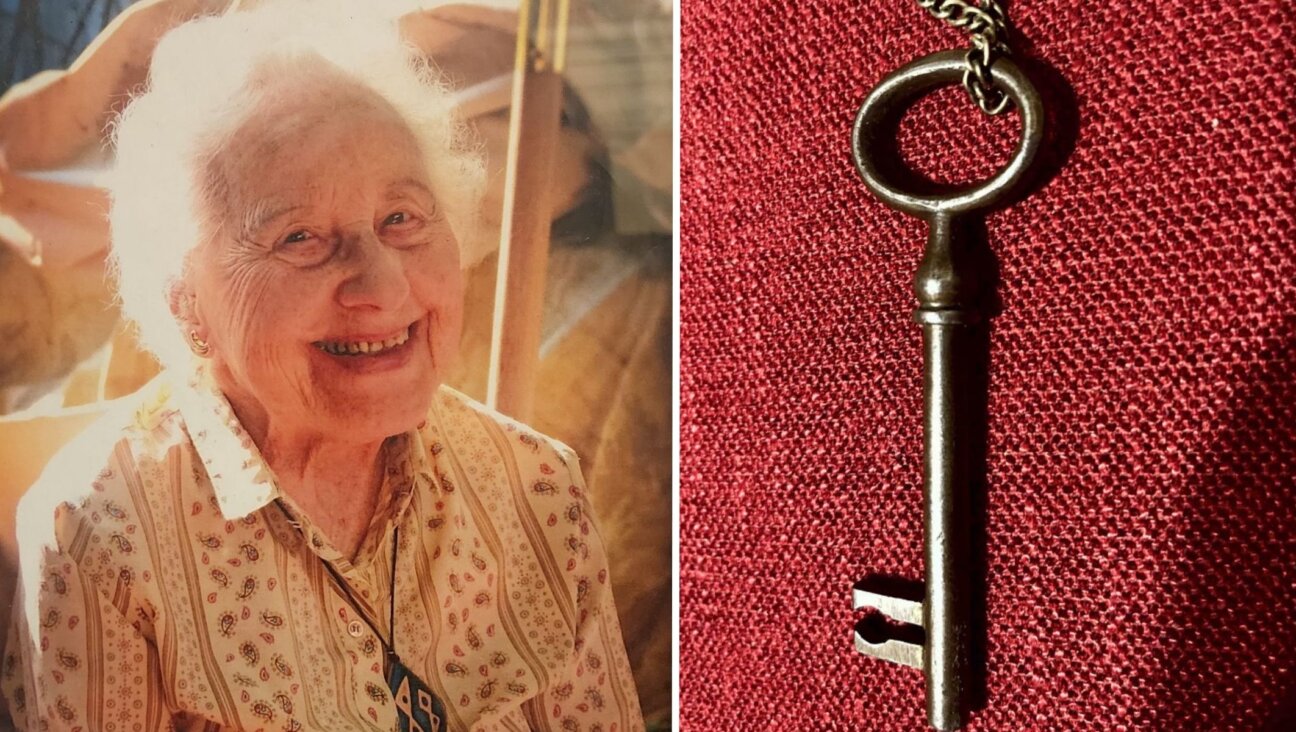Antisemitic incidents up 800% in the Netherlands since Oct. 7, Dutch watchdog reports
“It is very worrying that Jews in the Netherlands are held responsible for conflicts taking place in the Middle East,” read a report by the Center for Information and Documentation on Israel

Thousands of pro-Palestinian supporters at a protest in Rotterdam, the Netherlands, Oct. 22, 2023. (Romy Arroyo Fernandez/NurPhoto via Getty Images)
(JTA) — Reports of antisemitic incidents have spiked over 800% in the Netherlands since Oct. 7, a leading Dutch-Jewish watchdog group has reported.
The surge only reflects antisemitic acts reported to the Center for Information and Documentation on Israel (CIDI), not all incidents filed to police departments and other anti-discrimination bureaus.
CIDI would not release specific incident numbers but said the barrage of reports it has received since the start of the Israel-Hamas war is 818% higher than its monthly average recorded over the past three years. The group tallied 183 total incidents for all of 2021.
“It is very worrying that Jews in the Netherlands are held responsible for conflicts taking place in the Middle East,” read the CIDI report released on Tuesday. “It seems as if Israel is being used to beat Jews.”
According to CIDI researcher and policy advisor Hans Wallage, it’s not only the numbers that have grown — the range of attacks on Jews has increased as well.
“I see way more variety of different incidents that I didn’t see before, and also more variety in the place where it happens,” Wallage told the Jewish Telegraphic Agency. “There are a lot of schools — elementary, high schools, universities — having way more incidents that I didn’t see before the 7th of October.”
In one school, a Jewish boy was threatened with a knife and hit on the head with a bottle while classmates called him “kankerjood,” a Dutch slur meaning “cancer Jew.” Another boy was told that his classmates would throw him off a bridge and drown him because he was Jewish. Recurring reports describe students being accosted for wearing Star of David necklaces, being shown the Hitler salute and being told that Hitler “didn’t finish his job.”
Wallage believes the rash of school incidents has to do with social media, which gives children unprecedentedly rapid and unchecked access to hate speech, conspiracy theories and incitement.
“We don’t have a filter as adults sometimes, but children completely don’t have a filter of what to share — they share everything,” he said. “What’s a lie? After a while, if you read it all the time and share videos all the time online, it’s going from the online world to the real-life world.”
Most of the conspiracy theories circulating through Dutch schools follow old antisemitic tropes, simply repackaged for a younger generation, said CIDI director Naomi Mestrum.
“It’s the same conspiracy theories,” Mestrum told JTA. “Jews control the world and the media, and this [Hamas attack] must be fake, they staged this because it fits their agenda.”
Outside of schools, CIDI has recorded mezuzahs torn off doors and swastikas sprayed on windows, along with frequent threats and verbal abuse. General antisemitic statements on social media are excluded from the figures, unless they were specifically sent to an individual through a direct message.
Shortly after Oct. 7, the only Jewish weekly magazine in the Netherlands — Nieuw Israelietisch Weekblad, known in English as the Dutch Jewish Weekly — switched from its clear plastic packaging to anonymous white envelopes, according to editor-in-chief Esther Voet. She said that her staff was flooded with calls from anxious subscribers who didn’t want their neighbors to know they were Jewish.
Although it is typical for antisemitism to flare in the Netherlands during conflicts in Israel and the Palestinian territories, CIDI researchers said they have never seen a surge of incidents like this before. And like other Jewish communities across Europe, many Dutch Jews feel they are in new territory.
“People feel that it’s different now, and it will be forever different from now on,” said Mestrum.
This article originally appeared on JTA.org.
A message from our Publisher & CEO Rachel Fishman Feddersen

I hope you appreciated this article. Before you go, I’d like to ask you to please support the Forward’s award-winning, nonprofit journalism so that we can be prepared for whatever news 2025 brings.
At a time when other newsrooms are closing or cutting back, the Forward has removed its paywall and invested additional resources to report on the ground from Israel and around the U.S. on the impact of the war, rising antisemitism and polarized discourse.
Readers like you make it all possible. Support our work by becoming a Forward Member and connect with our journalism and your community.
— Rachel Fishman Feddersen, Publisher and CEO




























